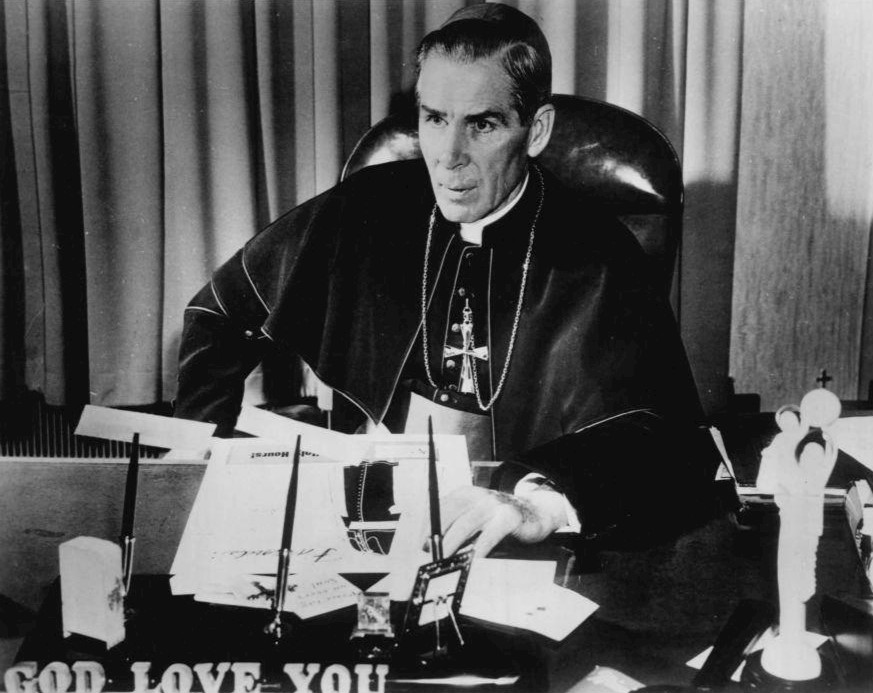Frases célebres de Fulton J. Sheen
Fulton J. Sheen: Frases en inglés
“Communism is the final logic of the dehumanization of man.”
Second Series, p. 122
Life Is Worth Living (1951–1957)
which the Scriptures call "false peace"
Fuente: Peace of Soul (1949), Ch. 6, p. 112
Fuente: Peace of Soul (1949), Ch. 1, p. 1 (the opening paragraph of the book)
God and Intelligence in Modern Philosophy (1925). p. 86
Fuente: Peace of Soul (1949), Ch. 1, p. 9
Fuente: Peace of Soul (1949), Ch. 1, p. 7
Fuente: Peace of Soul (1949), Ch. 5, p. 71
"A Plea For Intolerance" (1931)
Fuente: The Armor of God (1943), Ch. 1, p. 4
“There are angels near you to guide you and protect you, if you would but invoke them.”
Angels
Life Is Worth Living (1951–1957)
Contexto: There are angels near you to guide you and protect you, if you would but invoke them. It is not later than we think, it is a bigger world than we think.
“Economic disorder is a symptom of spiritual disorder.”
Fuente: Peace of Soul (1949), Ch. 2, p. 27
Contexto: It is assumed by many reformers that the principal and major cause of unhappiness is economic insecurity, but this theory forgets that there are economic problems only because men have not solved the problems of their own souls. Economic disorder is a symptom of spiritual disorder.
“Since a week ago last Saturday, we can no longer expect them to defend the law of God.”
These sects will work out the very logic of their ways, and in 50 or 100 years there will be only the Catholic Church and paganism. We will be left to fight the battle alone, and we will."
Quoted in The Birth Control Review, May 1931, volume XV, no. 5., pp. 143-144. Reaction to the report of the Federal Council of Churches in America which, in March 1931, "endorsed 'the careful and restrained use of contraceptives by married people,' while at the same time conceding that 'serious evils, such as extramarital sex relations, may be increased by general knowledge of contraceptives.'" http://lifedynamics.com/app/uploads/2015/09/1931-05-May.pdf https://www.google.com/search?q=Church+and+paganism.+We+will+be+left+to+fight+the+battle+alone%2C+and+we+will&ie=utf-8&oe=utf-8&aq=t&rls=org.mozilla:en-US:official&client=firefox-a&channel=rcs#channel=rcs&tbm=bks&q=%22Since+a+week+ago+last+Saturday%2C+we+can+no+longer+expect+them+to+defend%22+
Fuente: Seven Words of Jesus and Mary: Lessons from Cana and Calvary
Foreword to Radio Replies Vol. 1, (1938) page ix
Variante: There are not over a hundred people in the United States who hate the Catholic Church. There are millions, however, who hate what they wrongly believe to be the Catholic Church.
“Too many people get credit for being good, when they are only being passive.”
As quoted in Seven Words to the Cross (1979) by Ellsworth Kalas, page 93
Contexto: Too many people get credit for being good, when they are only being passive. They are too often praised for being broadminded when they are so broadminded they can never make up their minds about anything.
Fuente: Seven Words of Jesus and Mary: Lessons from Cana and Calvary
“The danger today is in believing there are no sick people, there is only a sick society.”
Second Series, p. 186
Life Is Worth Living (1951–1957)
Fuente: Seven Words of Jesus and Mary: Lessons from Cana and Calvary
“Some will not look on suffering because it creates responsibility.”
Those Mysterious Priests (1974), p. 66
Treasure in Clay: the Autobiography of Fulton J. Sheen, (New York, NY: Image Books/Doubleday, 1980)
